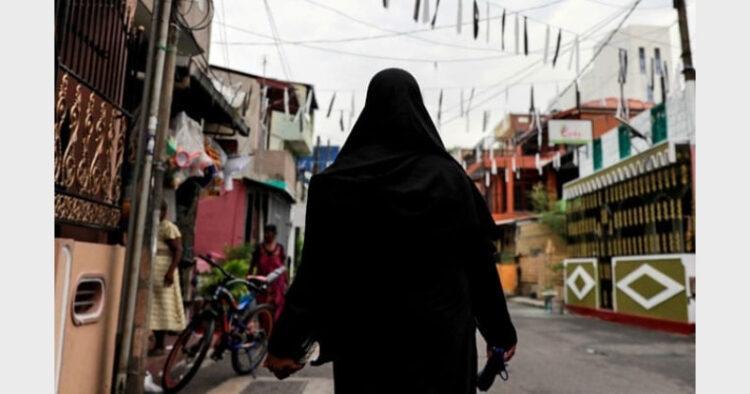After many European Countries like the Netherlands, France, Australia, Belgium, Germany, Switzerland, Denmark Sri Lankan Government is also planning to ban Madrassa and Burqa in the Country. Sri Lanka will ban the wearing of the burqa and will shut more than a thousand Islamic schools, the government minister declared during a press conference on Saturday.
Minister for public security Sarath Weerasekera told that a bill was already signed on Friday for cabinet approval to ban the full-face covering worn by Muslim women on the grounds of “national security”. Further, he said that “In our early days, Muslim women and girls never wore the burqa, it is a sign of religious extremism. We are definitely going to ban it. Weerasekera also said that the government plans to ban more than a thousand madrassa and Islamic schools also, which are flouting the national education policy. Nobody can open a school and teach whatever they want to the children, said Weerasekera”.
The wearing of the burqa in the majority-Buddhist nation was temporarily banned in 2019 also after the bombing of churches and hotels by Islamic militants that killed more than 270 people. Later that year, Gotabaya Rajapaksa, best known for crushing a decades-long insurgency in the north of Sri Lanka as defence secretary, was elected president after promising a crackdown on extremism.
On April 21, 2019, at about 08.45, nine suicide bombers detonated their devices in six locations around the country which was taken more than 270 lives. Three blasts were at churches: in the Kochchikade district of Colombo; in Negombo, to the north of the capital; and in the eastern city of Batticaloa. The churches were packed with worshipers celebrating Easter. The other three blasts were at three luxury hotels in the capital — the Shangri-La, Kingsbury and Cinnamon Grand. The attackers wore Burqa.
The Islamic State (IS) militant group had claimed responsibility for the attacks. They released a video also at that time. They had done it with the assistance of the local militant group National Thowheed Jamath (NTJ). Islamist preacher Zahran Hashim, who founded the NTJ but was reportedly later expelled from the group, is suspected of having been the bombers’ ringleader. He blew himself up at a hotel in Colombo. A video released by IS showed Hashim pledging allegiance to the group’s then-leader Abu Bakr al-Baghdadi.
After this incident Government of Sri Lanka has taken strong action against crushing extremism in the country. During the COVID-19 pandemic in the year 2020, the Sri Lankan government mandated the cremation of Covid-19 victims, which is against the wishes of Muslims who bury their dead body. Although this ban was lifted earlier this year after criticism from the United States and international rights groups the recent increase in violent incidents has led to this decision by the Sri Lankan government in the interest of the people of their country.














Comments